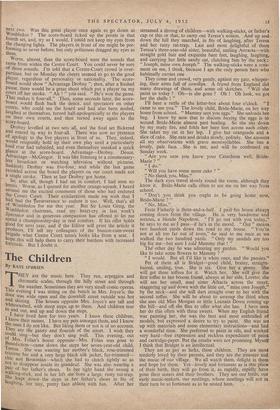The Children
By KATE O'BRIEN THEY are the music here. They run, arpeggios and chromatic scales, through the hilly street and through the weather. Sometimes they are very small comic operas. This evening I was sitting on the bench in Mrs. Joyce's; the door was wide open and the downhill street outside was hot and shining. The houses opposite Mrs. Joyce's are tall and whitewashed, with steep steps up to them. And children tear in and out, and up and down the steps. I have lived here for two years. I know these children; I know their names. I have my pets amongst them, and I know the ones I do not like. But liking them or not is of no account. They are tiie gaiety and flourish of the street. I wish tout of sing—but they don't sing well. This evening, out of Mrs. Folan's house opposite—Mrs. Folan was gone to Benediction—came down the steps her seven-year-old child, Teresa. She was wearing her mother's black, rose-trimmed tricorne hat and a very large black silk jacket, fur-trimmed- chic and Bostonian—which she had to clutch tightly so as not to disappear inside its grandeur. She was also wearing a pair of her father's shoes. In her right hand she swung a walking-stick, and in her left she bore a large, rusty rat-trap. She leapt down- the steps in her father's shoes in fits of laughing, her tiny, pretty face ablaze. with fun. After her streamed a throng of children—with walking-sticks, or father's cap or this or that, to carry out Teresa's notion. And up and down the hill they marched, in fits (4 laughing, after Teresa and her rusty rat-trap. Last and most delightful of them Teresa's three-year-old sister, beautiful, smiling Attracta—with straight gold hair and exquisite bare feet, laughing, laughing, and carrying her little sandy cat, clutching him by the 'neck : " Joseph, mine own Joseph." The walking-sticks were a coin- ment on me, I think, because I am the only person here who habitually carries one They come and crowd, very gently, against my gate, whisper- ing, their arms full' of cowslips. A friend from England did many drawings of them, and some oil sketches. Will she paint us today ? Oh—is she gone ? Oh ! Oh look, we got her the shells ! "
I'll hear a rattle of the letter-box about four o'clock. " I came to see you." The lovely child, Bride-Marie, on her way home from school. "Mammy sent you eggs." She unloads her bag. I know by now that to discuss buying the eggs is to wound. Bride-Marie almost past healing. So she sits down by my study fire, and folds her bare feet across each other. She takes my cat in her lap. I give her orangeade and a slice of cake. She eats and drinks slowly, politely. She answers all my observations with grave monosyllables. She has a lovely, pale face. , She is ten, and will be confirmed on Sunday week. " Are you sure you know your Catechism well, Bride- Marie ? '
" I do."
" Will you have some more cake ? "
`.` No thank you, Miss."
The dark eyes travel slowly round the room, although they know it. Bride-Marie calls often to see me on her way from school.
" Don't you think you ought to be going home now, Bride-Marie ?
" No, Miss." Feste Flaherty is three-and-a-half. I pa-it-his house always coming down from the village. He is very handsome and serious, a blonde Napoleon. " I'll go out with you today," he says to me as ,I pass—if he's in the mood. " Out " means two hundred yards down the road to my house. " You're not at all too far out of town," -he said to me once as we walked the two hundred yards. " Only my sandals are too big for me—but sure I told Mammy that ! ' The other day he was admiring my garden. " Would you like to take some flowers to Mammy ? "
" I would. But all I'd like is white ones, and the pansies." Pet of them all is Bridget-i-good child, brainy, straight- haired, smiling, true. She is six. Give her a penny. She will get three toffees for it. Watch her. She will give the first toffee to her bosom friend, always at her side, Loreto; she will see her small, mad sister Athacta across the street. staggering up'and' down with the little cat, " mine own Joseph," by the neck—and she will dart straight over to her with the second toffee. She will be about to unwrap the third when she sees old Miss Mongan or little Leanain Down coming up the hill—and off she flies to offer what she has. I have seen her do this often with three sweets. When my English friend was painting her, she was the best and most enthralled of models, but expressed a desire to try to paint. She was set up with materials and some elementary instructions—and had a wonderful time. She preferred to paint in oils, and worked very hard—free expression and reckless expenditure of paint and cartridge-paper. But the results were not promising. Myself I think that Bridget is an intellectual.
They are as gay as larks, these children. They are most tenderly loved by their parents, and they are the treasure and the music of our village. We all watch them, delight in them and hope for them. Yet—lovely and fortunate as is this place of their birth, they will go from it, as rapidly, rapidly have gone their sisters and their brothers. They are our birds, our early music-makers, our nestlings, whose nestlings will not in their turn be so fortunate as to be nested here. .


























































 Previous page
Previous page